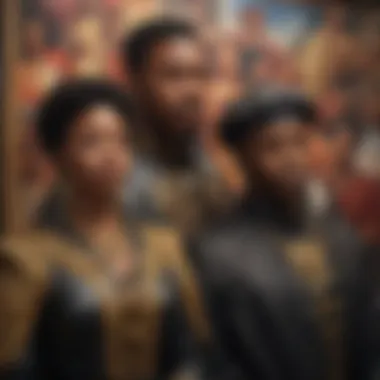Understanding Black Identity: A Deep Dive into Heritage and Experience


Intro
Understanding black identity is an ongoing conversation. It is a complex interplay of history, culture, and personal experiences. By examining these elements, we can uncover the richness of black heritage and its impact on society. This exploration invites a closer look at the difficultés and the victories found within the community. As we begin this journey, it is essential to acknowledge the broad spectrum that constitutes black identity, tailored against the backdrop of significant historical events and cultural evolution.
Drawing from scholarly sources and community narratives, this exploration is significant for all. It spans influences that shape social dynamics, cultural expressions, and personal identity. We should look through various lenses, including literature, history, sociology, and personal testimonies. This approach offers a holistic view of what it means to identify as black in today's world.
The forthcoming sections will articulate a thorough understanding of the myriad facets of black identity, grounded in both historical precedents and contemporary issues.
Defining Black Identity
Defining Black identity is crucial in understanding the dynamics of race and cultural belonging. In this section, we shall dissect several key elements that contribute to the formation of Black identity. This includes its historical context, cultural heritage, and personal experiences. Recognizing these elements can enrich one's comprehension of the challenges and achievements encountered by the Black community, ultimately leading to greater empathy and social awareness.
Historical Context
The historical context is pivotal when defining Black identity. It is characterized by a legacy of colonization, slavery, and resistance. Events such as the Trans-Atlantic slave trade have molded perceptions of Black identity and experiences. African Americans and people of African descent in various countries have a shared history of struggle and resilience against oppression.
For instance, the remnants of colonial thinking persist today, influencing how identity gets shaped. The civil rights movement represents a significant milestone, with figures such as Martin Luther King Jr. and Malcolm X advocating for social justice. Through understanding certainties of the past, it becomes evident why current societal challenges continue to surface.
Cultural Heritage
Cultural heritage consists of traditions, values, and customs passed down through generations. It's an essential component of Black identity that emphasizes collective memory and connection within the community. Elements like music, dance, art, food, and religious practices vary across regions, yet many people of African descent share a strong cultural identity rooted in their heritage.
It's crucial to acknowledge that cultural expressions evolve. The influence of the African diaspora can be seen in various genres like jazz, hip-hop, and reggae. These contributions highlight vibrancy in culture that shapes the identity of Black individuals and fosters community pride.
Personal Experience
Personal experience serves as an essential aspect of how one identifies as Black. Each individual's journey, shaped by ethnic background and geography, affects their perception of self and community. Factors such as familial connections, education, and latent biases lend complexity to personal experiences.
Additionally, people's stories serve to challenge preconceived notions about Black identity. The experiences of individuals may resonate on emotional and experiential levels, illustrating profound insights into resilience and the pursuit of dignity. Recognizing the diverse narratives in the Black community encourages dialogue that can promote understanding.
One's identity is often a multilayered concept, informed by personal choices and social realities. Recognizing diverse stories helps dismantle stereotypes and promotes authenticity in identities.
By considering historical context, cultural heritage, and personal experience, we gain a holistic view of Black identity. This informed awareness sets the tone for deeper exploration of themes surrounding point of view and understanding in the broader article.
The Influence of Ancestors
The concept of ancestry plays a critical role in shaping black identity. It enables individuals to comprehend their roots and the historical legacy that informs their current experience. African descent embodies rich heritages transmitted across generations. These legacies are both a source of pride and a foundation for understanding the ongoing struggle and resilience of black communities. Families create connections to ancestors that foster a sense of belonging and self-awareness. This section explores two key elements of this influence: the legacy of resilience and cultural practices that endure through time.
Legacy of Resilience


The idea of resilience is central to understanding black identity. This trait is often woven into the fabric of personal and collective experiences of black people. Many individuals have stories of overcoming adversity tied to generational narratives. Ancestry teaches that hardship is a reality but not a limit on one's potential.
Testimonies of struggle involve slavery, segregation, and ongoing discrimination. These historical realities provide the backdrop for the modern ethos of endurance and strength.
Resilience is not just a concept; it’s a lived experience passed down through generations.
This legacy manifests in several ways:
- Strength in Unity: Family structures often emphasize communal living, fostering support networks that can buffer against societal challenges.
- Cultural Memory: Traditions, stories, and rituals keep memories alive, educating future generations on their identity and struggles faced.
- Continual Adaptation: The ability to adapt in response to changing situations has become inherent within these communities.
By embracing this legacy, individuals cultivate pride and assert their identity while facing contemporary challenges.
Cultural Practices
Cultural practices play an integral role in perpetuating the identity shaped by ancestry. This encompasses various forms of expression — music, dance, art, and culinary traditions — all of which carry profound significance and emotional resonance.
Cultural expressions can be categorized into:
- Oral Traditions: Storytelling serves a dual purpose, preserving history and encouraging moral teachings and social values among youth.
- Artistic Expression: In the form of music genres such as jazz, blues, or hip-hop, these practices illustrate layered meanings of identity that encompass emotions, life experiences, and societal commentary.
- Rituals and Celebrations: Including annual festivals or significant family gatherings that commemorate history and celebrate heritage. Foods prepared during these events may have cultural roots dating back several generations.
Through these and other practices, black individuals treasure connections with their ancestors, solidifying their identity while providing a sense of continuity with the past. This link between ancestry and current experiences fosters a nuanced understanding of oneself and one’s place within a larger cultural framework.
Contemporary Issues in Black Identity
The contemporary landscape of black identity is shaped by numerous pressing issues. These issues reflect the struggles, adaptability, and resilience of the black community. Understanding them adds depth to one's grasp of identities, both personal and collective. Moreover, contemporary issues establish connections to history and illustrate how systemic inequalities persist today.
Racism and Discrimination
Racism remains a significant factor in shaping black identity in modern societies. Many black individuals face societal discrimination that manifests in myriad forms—such as systemic inequities in employment, education, and law enforcement. This persecution goes beyond individual acts of prejudice. It is embedded within institutions and cultures, leading to differential social treatment.
Such racism has profound psychological effects, perpetuating feelings of alienation and distrust. It can hinder upward mobility, constraining access to opportunities for education and advancement. Furthermore, the constant navigation through biased systems adds to the emotional toll that exists amongst black citizens.
Intersectionality and Identity
Understanding intersectionality is crucial in comprehending Black identity, as it allows for a multifaceted analysis of experiences relating to race, gender, class, and sexuality. Intersectionality acknowledges that individuals can belong to multiple social groups simultaneously, shaping their personal identity and experiences. For Black individuals, aspects such as dismissive views about gender roles, economic barriers due to class, and social stigma surrounding sexual orientation can contribute to unique challenges. Each layer complicates the landscape of Black identity and informing how others perceive them while interacting with society.
Gender Perspectives
Gender plays a significant role in shaping individuals’ experiences within the Black community. Black women, for instance, often face a double jeopardy of racism and sexism, which affects their societal standing and opportunities in various aspects of life. They may navigate a world that dismisses their worth both as women and as members of the Black community.
In contrast, Black men may feel pressured to conform to notions of masculinity, which are often steeped in stereotypes and systemic issues. These issues include higher prejudice within policing and criminal justice systems. Therefore, addressing gender perspectives helps to unpack varying accounts of oppression and privilege felt within the Black experience. Understanding these challenges enables us to create even more inclusive platforms that advocate for their rights and well-being.


Class Dynamics
Class dynamics within the Black community can prominently impact identity formation. Economic disparities often lead to differing life experiences, creating chasms even within a single community. Those in lower-income brackets may confront societal pressures concerning education, employment, and property access.
The intersection of race and class highlights systemic inequalities. A higher percentage of Black individuals live in poverty compared to their White counterparts, influencing cultural practices and opportunities available to them. Here, we can often see how class constraints may foster a shared sense of identity based on survival and mutual support, even as some individuals reach levels of socioeconomic advancement. A thoughtful investigation of class dynamics brings to light these critical nuances that are paramount in understanding Black identity.
LGBTQ+ Experiences
LGBTQ+ experiences within the Black community offer a complex and often invisible take on identity. Black queer individuals may operate on the fringes of both identities: being Black, along with being part of the LGBTQ+ community. This dual experience can produce social ostracization, struggling with acceptance among both individuals. Issues such as violence against LGBTQ+ members often cut deeper within these intersections, leading to further isolation.
Recognition of LGBTQ+ perspectives helps dismantle stereotypes that validate exclusion and enhances mutual understanding across differing experiences. Moreover, elevating voices from within the community allows for a more nuanced conversation about identity and belonging.
It is through these various lenses—gender, class, and sexuality—that individuals derive their unique identity constructs and engagements with society. Contrasting and comparing identities illuminates experiences often overlooked in broader discussions.
Other resources provide more insight into Black identity and intersectionality such as Wikipedia, Britannica, and Reddit interactions on community support and issues related to race and class dynamics.
Global Perspectives on Black Identity
Global Perspectives on Black Identity offers crucial insights into the varied experiences and interpretations of what it means to be black around the world. This section emphasizes that black identity is not solely defined by individual nations or regions. Instead, global dynamics shape these identities through shared histories, cultures, and experiences across borders. Understanding these perspectives deepens our knowledge and fosters a sense of global solidarity among black communities.
Such diverse insights can enhance dialogue about race-related issues. By examining how black identity differs in various contexts, we can appreciate the intersections of ethnicity, culture, and politics better. This multifaceted approach allows us to acknowledge both shared experiences of resilience and distinct narratives shaped by local histories.
The African Diaspora
The African Diaspora comprises a rich tapestry of cultures, traditions, and identities that stem from the migration of people of African descent across the world. This vast geographical spread brings an array of experiences that contribute to a unified but diverse black identity. From the Caribbean and Latin America to North America and Europe, each region has encountered historical challenges and triumphs specific to its context.
For example, Afro-Latino communities represent a blend of African and Latin cultures. This intersection provides unique perspectives on race and identity. Similarly, in Europe, the migration of African peoples invites discourse on colonial history, modern racism, and social integration, contributing to a broader understanding of black identity in different societies.
- The African Diaspora highlights landmarks such as:
- Historical segregation.
- Cultural resilience against oppression.
- Contributions to global culture (arts, sports, cuisine).
Cultural Exchanges
Cultural Exchanges significantly influence black identity by fostering mutual understanding and respect among different communities. This interaction allows for the sharing of practices, languages, and histories, shaping how individuals perceive their identities.
Cultural Exchanges also enrich artistic innovations. Music and dance descended from African traditions now permeate global cultures. Genres like jazz, reggae, hip-hop, and Afrobeat showcase distinct roots yet illustrate shared elements.
In contemporary applications, social media has emerged as a platform, making narratives from different communities accessible and relatable. Memes, videos, and art discuss struggles and resistance, asserting a global black narrative that challenges stereotypical representations.
Cultural Exchanges offer an opportunity to engage actively with shared experiences, promoting interconnectedness while honoring individual heritage.


Education and Awareness
Understanding black identity is complex and layered. Education and awareness form the backbone of this endeavor. They promote insight into injustices and prevent misconceptions about black cultures and experiences. When education is adequately structured, it encourages critical thinking and fosters understanding around one’s own identity and those of others. Moreover, addressing educational gaps about black history and social issues can empower communities and enhance societal discourse.
Curriculum Changes
Curriculum changes are vital in furthering education on black identity. Traditional curriculums often overlook or misrepresent contributions from black individuals. By integrating black history and perspectives at all educational levels, students gain a more balanced view of the past. This includes the acknowledgments of figures such as Frederick Douglass, Toni Morrison, and Nelson Mandela. Educational institutions should emphasize:
- Historical Accounts: Inclusion of significant events like the Civil Rights Movement helps illustrate ongoing struggles and successes in the fight for equality.
- Cultural Contributions: Highlighting achievements in arts and science provides a comprehensive understanding of the impact that black individuals have had worldwide.
- Current Issues: Encouraging discussion around current socioeconomic conditions can equip students with the knowledge needed to engage with today’s problems.
Educators should undergo training on biases to effectively teach these topics. Training can reduce stereotypes, allowing an environment where learners critique both historical and modern narratives. An informed student body can contribute positively to society.
Role of Literature
Literature serves as a deeply impactful medium for cultivating education and awareness about black identity. Written works allow readers to immerse themselves in the richness of black experiences. Through novels, poetry, and essays, individuals can better understand past struggles and modern realities. Prominent authors like Zora Neale Hurston and James Baldwin provide narratives that continue to shape dialogues around race.
Literature highlights:
- Unique Perspectives: Every story offers insights into different experiences and life realities.
- Emotional Connections: Engaging with texts allows readers to relate and empathize with characters’ journeys.
- Critical Reflection: Literary discussions incentivize readers to reflect on their beliefs and assumptions.
As readers grasp these narratives, they confront uncomfortable truths about societal structures. This confrontation is necessary for creating a more inclusive society. As awareness rises, so does the opportunity for real-world change. To build a rigorous grasp of black identity, it is essential to include literature that represents the vastness of black experiences in educational discussions.
Simultaneously championing curriculum changes alongside the rich tapestry of literature empowers scholars. The result is a generation that is perceptive to nuances of identity and history.
In summary, education regarding black identity, through curricular reforms and the power of literature, paves the way for a comprehensive understanding of the complexities unveiled throughout this article. Individuals can better engage in dialogues and commit to the ongoing pursuit of understanding and equality.
Culmination
The conclusion of this article serves as a pivotal point in understanding the intricate layers of black identity. As we have journeyed through historical contexts, cultural heritage, and contemporary challenges, it becomes clear that identity is not merely a label but a complex interplay of influences.
Reflection on Identity
Reflecting on black identity invites us to consider both the collective and personal experiences. Individual narratives are steeped in history, shaped by not just familial ties but also societal perceptions. The experiences vary widely, impacted by location, class, and personal choices. Each narrative represents a piece of a larger mosaic that forms the identity of a community.
Identity is an evolving process. It can manifest in pride, resilience, and defiance, but it also bears the weight of challenges like discrimination and social injustice. The stories of individuals within the black community reveal not only hardships but also triumphs, strengths, and adaptations that have global impacts. To truly grasp the potency of black identity, recognition of its dynamism is crucial.
Call for Understanding
A call for understanding indicates a need to broaden perspectives around black identity. Awareness starts with dialogue; educators, policymakers, and the public must actively dismantle the frameworks that perpetuate misunderstanding and stereotypes. Promoting inclusivity within conversations about race ensures that diverse voices are amplified.
There are key actions to consider:
- Educate: Incorporate black history and culture into educational curricula. This education should go beyond representation to ensure a critical understanding of systemic issues as well.
- Promote Representation: Ensure black voices occupy spaces in media, politics, and decision-making roles.
- Foster community: Build inclusive platforms that welcome diverse expressions and experiences of identity.
By engaging with these actions, individuals can contribute to a greater empathetic understanding of black identity. This is not an issue confined to academic or discourse circles but is a call for communities to engage in collectively urgent conversations.
In sum, understanding black identity not only enriches our comprehension of race but also humanizes the narrative, promoting a journey toward inclusion and respect for diverse identities within society.







